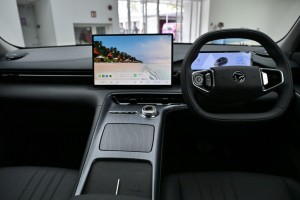Hyundai Mobis improves EV battery cooling with 'Pulsating Heat Pipes'
By CARSIFU | 21 December 2024
SEOUL: Hyundai Mobis has unveiled a new battery cooling technology aimed at preventing overheating during ultra-fast electric vehicle (EV) charging.
The company introduced a material called "Pulsating Heat Pipe" (PHP), designed to reduce the internal temperature of battery cells that rise during rapid charging.
It plans to commercialise the technology.
The PHP is made from aluminum alloy and refrigerant, positioned between battery cells to manage heat.
As battery temperature rises during ultra-fast charging, the PHP maintains a stable thermal system, reducing charging times and preventing overheating.
Unlike standard heat pipes, which use metal tubes for heat dissipation, PHPs work by circulating refrigerant internally, allowing for greater heat transfer with minimal performance degradation. They are more efficient than traditional aluminum, transferring heat more than 10 times faster, which helps cool down the battery cells rapidly.
Battery systems typically include battery management systems (BMS), cooling fans, and various devices to manage heat.
Hyundai Mobis integrated PHPs between each battery cell to transfer excess heat to cooling blocks, effectively controlling the temperature at the module level.
This innovation is crucial as optimising the cooling system in battery cells is key to preventing overheating and ensuring battery efficiency.
Hyundai Mobis also developed a process for large-scale production of PHPs, using a press technique that simplifies manufacturing and reduces costs.
The new PHPs are only 0.8mm thick, much thinner than standard heat pipes, which are around 6mm thick. This allows for easier installation in vehicle batteries and improves the overall quality of the product.
Tags
Autos Hyundai
Reviews

8.8
smart #1 (Premium): Agile, engaging, roomy, premium motoring

6.6
Suzuki V-Strom 250 SX: Multi terrain warrior

Proton e.MAS 7 impresses in quick dynamic driving exercises

Nissan Kicks e-Power: Kicking off a new efficiency

6.8
Mercedes-Benz GLB 200: Measured versatility

MG5: Slick and comfortable cruiser

8.2
Kia EV9: Prime cut

8.0
Triumph Tiger 1200 GT Pro: High adventure on two wheels
Videos

The Snowball – Lamborghini’s Heartwarming Christmas Story of...

EVOGO battery swapping solution showcased at IAA Mobility 20...

Jaguar's Bold Type 00 Concept: A Glimpse into the Future of ...
